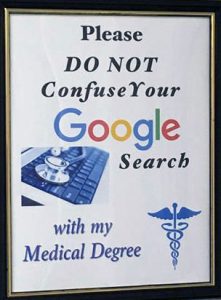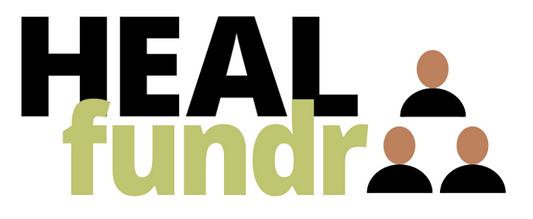Last Updated on April 21, 2021
(This is Part 2 of a 2-part series. You can find part 1 here.)
Almost everyone is susceptible to self-diagnosis from well-meaning searches, but some people are more prone than others. When I was in medical school 39 years ago, before the internet took off, we called it Medical Student Disease. It usually involved one or more of us, depending on what ordinary symptoms we had that day, wondering if we had the disease we were studying. It usually subsided when we got into enough detail about these diseases to realize we didn’t have them. I’m sure it’s a side-effect of the training of any healthcare professional.
Possible Hazards
Using Dr. Google to make a self-diagnosis in order to avoid seeking medical care, second-guess your primary care provider, or seek alternative treatments can cause a lot of problems.
Delaying the Correct Diagnosis and Treatment
Using Google to make a diagnosis may lead to a misdiagnosis and delay the correct diagnosis. It can be further delayed for those who have difficulty surrendering their self-diagnosis after seeing their healthcare provider.
Cyberchondria
Cyberchondria is a form of illness anxiety disorder (formerly called hypochondria). The term was coined 20 years ago and is defined as a person who compulsively searches the internet for information about particular real or imagined symptoms of illness. While there are many environmental and innate factors that increase the risk of illness anxiety disorder, Dr. Google’s limitations are increasingly fueling the fire.
Since most bad diseases also have mundane symptoms, it becomes easy to be convinced there is something serious going on — especially as the symptoms are searched over and over again. A vicious cycle is created when anxiety leads to additional searches and more anxiety, making people more certain they have some terrible disease.
Higher Anxiety
Although it can happen to anyone, people with anxiety disorders or obsessive natures can be more susceptible to going down the Dr. Google anxiety rabbit hole. Even if reliable sites are initially consulted, it’s possible to go deeper into Cyberchondria Wonderland with every additional diagnosis or unreliable site that is found. The more websites consulted, the more likely it is to happen.
Forums, unmoderated chat rooms, Facebook, Twitter, or Instagram, and other spaces where personal experiences with medications and treatments are discussed are another possible source of anxiety. Google is very effective at finding them.
- Anything can be posted and it can be difficult to separate fact from fiction.
- Social media platforms are much more likely to feature testimony from those that are having significant difficulties with a medication or a treatment rather than those who are doing well with proper treatment. There are websites such as PatientsLikeMe or disease-specific organizations like the American Cancer Society that are moderated by and offer access to healthcare professionals for consultation.
Before becoming overly anxious about possible diagnoses, stop and do a reality/fact check with a healthcare professional.
Excessive Testing
While it is common for tests to be done when making a diagnosis, testing is not always necessary. In fact, unnecessary testing can cause problems.
Most tests have the risk of a false positive, meaning that the test indicates that something is abnormal when it really isn’t. The more tests that are done, the more likely this will happen.
An abnormal test will usually be repeated, along with others that may be associated with possible causes of the abnormal result on the first test. Since follow-up tests also have a risk of a false positive, the cycle could continue.
This may result in further consultations with Dr. Google about possible diagnoses based on any subsequent tests. This can lead down the same anxiety rabbit hole as initially searching symptoms.
In addition, some tests also have risks such as radiation exposure with CT scans, allergic reactions to testing materials, or damage from invasive procedures.
Unneeded and Potentially Harmful Treatment
Whether the diagnosis is correct or incorrect, there can be adverse consequences when people begin treatment of their self-diagnosed condition without consulting a medical professional. If they are fortunate, the only consequence will be wasted time and money on treatment that doesn’t work. If not, the treatment could make their condition worse and/or result in significant side-effects or complications. This is especially true as more potent medications become available over-the-counter.
Financial Loss
Self-diagnosis can be quite expensive. When an incorrect diagnosis is made, especially if Dr. Google has indicated that there is a rare or terrible disease, unnecessary money can be spent on frequent medical visits (especially emergency rooms), testing, and possibly incorrect and/or unnecessary treatment.
Alternatively, if the diagnosis is less ominous, Dr. Google can lay out an unneeded or overly expensive treatment plan involving over-the-counter medications and/or services. This may end up costing more than a healthcare visit and treatment plan covered by insurance.
Self-diagnosis can result in lost wages from too frequent medical visits or untreated illness that is severe enough to prevent working. In addition, the internet is commonly linked to commercial interest. Even some of the best patient education websites contain advertisements, some related to products for the condition being described. It can be difficult to resist the temptation of buying these products — especially sites sponsored by the manufacturer or when the product is available through the website.
Conflicts With Healthcare Providers
Your relationship with your healthcare provider is a partnership, with individual and shared roles. It is important to define, nurture, and evolve these roles. To that end, the internet can be a double-edged sword that needs to be handled carefully.
 Many patients think of the internet as an additional source of information to support their doctor’s decisions and enhance their relationship. When asked, most healthcare professionals would agree.
Many patients think of the internet as an additional source of information to support their doctor’s decisions and enhance their relationship. When asked, most healthcare professionals would agree.
Healthcare providers faced with internet medical information may go over relevant information with the patient. However, they likely do not have the time to sort through a large amount of information to find the relevant information or correct any misinformation picked up. If forced, this could lead to conflict which will affect the partnership. Without the healthcare provider’s involvement, a patient may value internet-derived information above that of their provider, causing them to ignore their advice, further damaging mutual trust.
Collecting information, especially using “Symptom Checkers,” may backfire when patients confidently diagnose themselves before the healthcare provider can diagnose them properly. Many patients who feel empowered to diagnose themselves will have conflict with their healthcare provider if there is disagreement over the diagnosis and treatment that can’t be resolved.
A mutually beneficial option is for providers to guide patients to reliable health information websites after seeing them. E-health literate patients who are able to find accurate and relevant information to present can improve provider/patient interaction and their outcome. Patients can then return to a situation where both patient and provider are better prepared to discuss the information.
Revealing Personal Information
When a web page is visited, a footprint is left that can be found by many third parties tracking online users. Personal data and volunteered medical information may be collected or even sold when seeking information on the internet about a health condition. Since there is little regulation, information can be used for many reasons such as targeted website ads.
Websites collect and handle personal information in different ways.
- They can track what pages are being looked at and may use it to determine what pages or type of information they present.
- They may ask users to “subscribe” or “become a member,” which usually involves providing personal information. Any credible site collecting this kind of information should spell out exactly what it will and won’t do with it.
- Many .com sites sell aggregate or collected data about their users to other companies, usually demographic information. In some cases, they may collect and reuse information that may allow users to be identified, such as your ZIP Code, email address, and birth date.
Conclusion
The bottom line is that the medical information on the internet needs to be handled with care and that Dr. Google is not up to the task of making accurate enough diagnoses to be safe for most people and diagnosing should be left up to the experts.
Whether trying to sort fact from fiction and information from advertising or trying to make sense of medical jargon and scientific concepts, medical information is best when recommended by healthcare providers or filtered through them.
Since it is not always possible for healthcare providers to be involved in seeking medical information on the internet, the next blog in this series will discuss how to properly seek, assess, and use medical information from Dr. Google.
Resources
For those who rely on Dr. Google due to the initial cost of seeking out a healthcare provider, NeedyMeds has information for over 18,000 free/sliding-scale/low-cost clinics in the United States. Search your ZIP code for clinics in your area to find free or low-cost medical attention. NeedyMeds also lists nonprofit and government organizations that provide assistance based on diagnosis, some of which provide diagnostic screenings. For more help finding information, call our toll-free helpline Monday-Friday 9am-5pm Eastern Time at 1-800-503-6897.
References
- Aboueid S, et al. The Use of Artificially Intelligent Self-Diagnosing Digital Platforms by the General Public: Scoping Review. JMIR Med Inform. 2019 May 1;7(2):e13445.
- Bender H, Khaleghi M, Singh B. Why Trusting Google for Your Health Is a Bad Idea. Newsweek website. Published: August 18, 2016. Accessed: March 8, 2021.
- Bernhard T. “Dr. Google,” Friend or Foe?. Psychology Today website. Posted: July 18, 2017. Accessed: February 24, 2021.
- Cirino E. Health Anxiety (Hypochondria). healthline website. Updated: September 29, 2018. Accessed: February 25, 2021.
- Conner C. The Grim Appeal of Diagnosing Yourself on the Internet. elemental website. Posted: May 30, 2019. Accessed: February 25, 2021.
- Crowe, K. Think twice before consulting Dr. Google, researchers say. CBS News website. Updated: April 7, 2018. Accessed: February 26, 2021.
- Filion J. 4 Things You Should Know Before Googling Health Symptoms. Gebauer Company website. Posted: March 10, 2016. Accessed: March 3, 2021.
- Finding and Evaluating Online Resources. National Center for Complementary and Integrative Medicine website. Updated: January 2018. Accessed: February 26, 2021.
- Fraser H, Coiera E, Wong D. Safety of patient-facing digital symptom checkers. Lancet. 2018 Nov 24;392(10161):2263-2264.
- Hesse B. The Patient, the Physician, and Dr. Google. AMA Journal of Ethics May 2012, Volume 14, Number 5: 398-402.
- Hudson L. The dangers of Doctor Google. news.com.au website. Posted: June 7, 2012. Accessed: March 3, 2021.
- Ibrahim L. The Dangers of Doctor Google. Dr. Linda website. Posted: November 28, 2014. Accessed: March 3, 2021.
- Jutel A. “Dr. Google” and his predecessors. Diagnosis (Berl). 2017 Jun 27;4(2):87-91.
- Kelly C, Eisenberg M. The precautions you should take before consulting ‘Dr. Google’. The Washington Post website. Posted: February 27, 2019. Accessed: March 3, 2021.
- Kwakernaak J, et al. Patients’ Use of the Internet to Find Reliable Medical Information About Minor Ailments: Vignette-Based Experimental Study. J Med Internet Res. 2019 Nov; 21(11): e12278.
- Nhlapo Z. Why Dr. Google Can Be Your Worst Enemy. Huffington Post UK website. Updated: January 1, 2018. Accessed: March 3, 2021.
- Turner A, et al. A Closer Look at Health Information Seeking by Older Adults and Involved Family and Friends: Design Considerations for Health Information Technologies. AMIA Annu Symp Proc. 2018; 2018: 1036-1045.
- Saleh N, Ortiz M. The Risks of Using the Internet to Self-Diagnose. verywell health website. Updated February 2, 2021. Accessed: March 3, 2021.
- Satow R. Hypochondria. Psychology Today website. Posted: March 17, 2017. Accessed: March 3, 2021.
- Semigran HL, et al. Evaluation of symptom checkers for self diagnosis and triage: audit study. BMJ 2015;351:h3480.
- Schmidt C. Cyberchondriacs Just Know They Must Be Sick. Scientific American website. Posted April 5, 2019. Accessed: March 3, 2021.
- Shrimsley R. Dr. Google: always good for a grim diagnosis. Financial Times website. Posted August 3, 2018. Accessed: March 3, 2021.
- Warraich H. Dr. Google Is a Liar. The New York Times. Published: December 16, 2018. Accessed: March 3, 2021.
- Why Dr. Google is not as dangerous as you think. The New Daily website. Updated May 26, 2015. Accessed: March 3, 2021.
- Why you shouldn’t Google your symptoms. YourLifeChoices website. Posted March 29, 2017. Accessed: March 3, 2021.





